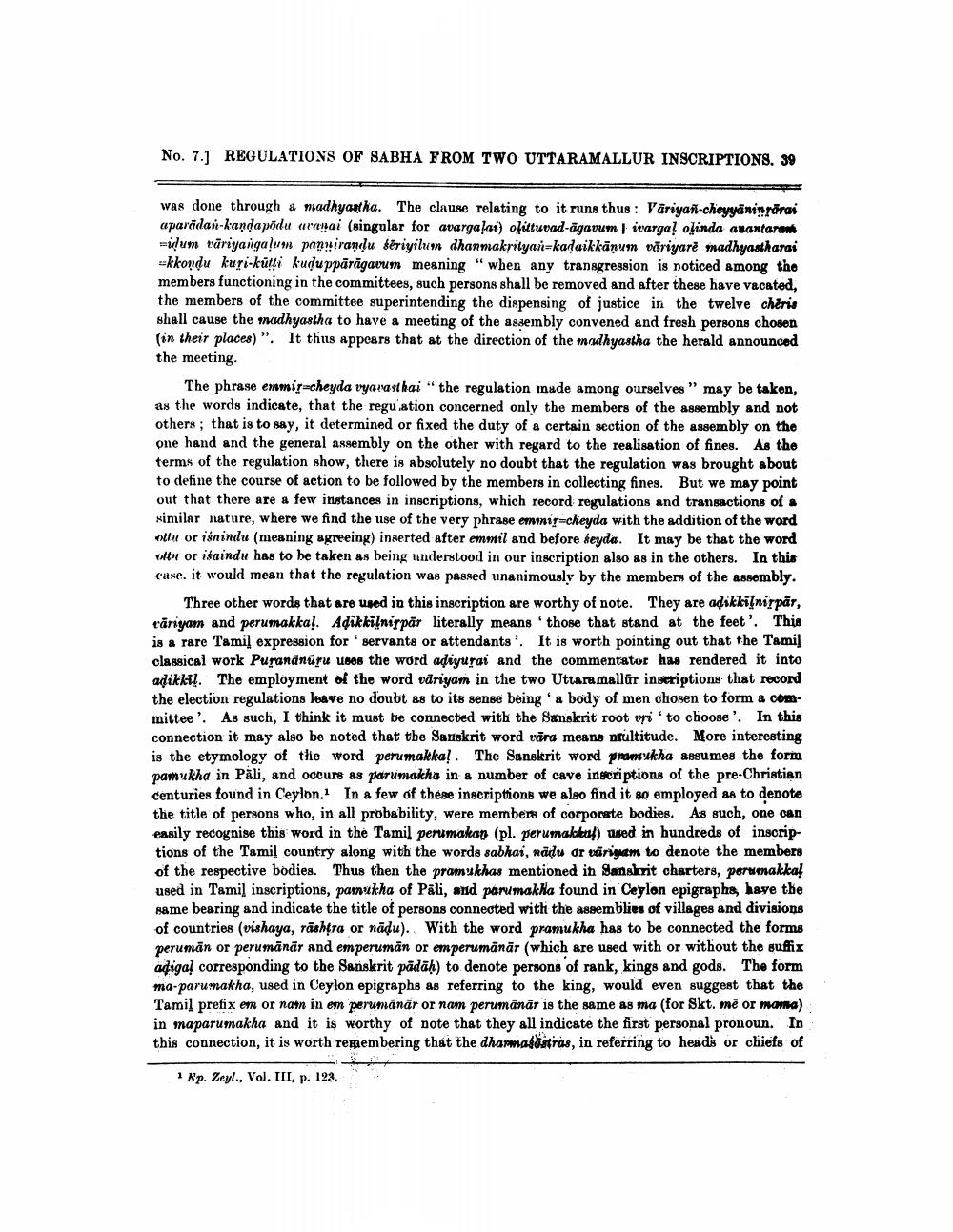________________
No. 7.] REGULATIONS OF SABHA FROM TWO UTTARAMALLUR INSCRIPTIONS. 39
was done through a madhyasha. The clause relating to it runs thus: Vāriyant-cheyyaningrai aparādai-kandapõdu aranai (singular for avargalai) olittuvad-agavum | ivarga! Olinda asantaran =idum tūriyangalum pannirandu sēriyilum dhanmakrityan-kadaikkanum vāriyarë madhyastharai --kkondu kuri-küti kuduppārāgavum meaning “when any transgression is noticed among the members functioning in the committees, such persons shall be removed and after these have vacated, the members of the committee superintending the dispensing of justice in the twelve chéris shall cause the madhyastha to have a meeting of the assembly convened and fresh persons chosen (in their places)". It thus appears that at the direction of the madhyastha the herald announced the meeting.
The phrase emmir-cheyda vyavasthai " the regulation made among ourselves" may be taken, as the words indicate, that the regulation concerned only the members of the assembly and not others; that is to say, it determined or fixed the duty of a certain section of the assembly on the one hand and the general assembly on the other with regard to the realisation of fines. As the terms of the regulation show, there is absolutely no doubt that the regulation was brought about to define the course of action to be followed by the members in collecting fines. But we may point out that there are a few instances in inscriptions, which record regulations and transactions of a similar nature, where we find the use of the very phrase emmir-ckeyda with the addition of the word othu or isnindu (meaning agreeing) inserted after emmil and before keyda. It may be that the word vittu or isaindu has to be taken as being understood in our inscription also as in the others. In this case. it would mean that the regulation was passed unanimously by the members of the assembly.
Three other words that are used in this inscription are worthy of note. They are adikkilnispār, rāriyam and perumakkaļ. Adikkilnispār literally means those that stand at the feet'. This is a rare Tamil expression for servants or attendants'. It is worth pointing out that the Tamil classical work Puranänúru ubes the word adiyurai and the commentator has rendered it into adikkil. The employment of the word väriyam in the two Uttaramallür inscriptions that record the election regulations leave no doubt as to its sense being a body of men chosen to form & committee'. As such, I think it must be connected with the Sanskrit root vri to choose'. In this connection it may also be noted that the Sanskrit word vīra means ntultitude. More interesting is the etymology of the word perumakkal. The Sanskrit word pramukha assumes the form pamukha in Pāli, and occurs as parumakha in a number of cave inscriptions of the pre-Christian centuries found in Ceylon. In a few of these inscriptions we also find it so employed as to denote the title of persons who, in all probability, were members of corporate bodies. As such, one can easily recognise this word in the Tamil perumakan (pl. perumakka!) used in hundreds of inscriptions of the Tamil country along with the words sabhai, nadu or vāriyam to denote the members of the respective bodies. Thus then the pramukhas mentioned in Sanskrit charters, perumakkal used in Tamil inscriptions, pamukha of Pāli, and parumakha found in Ceylon epigraphe, have the same bearing and indicate the title of persons connected with the assemblies of villages and divisions of countries (vishaya, răshtra or nādu). With the word pramukha has to be connected the forms peruman or perumānār and emperuman or em perumānār (which are used with or without the suffix adigal corresponding to the Sanskrit pādāh) to denote persons of rank, kings and gods. The form ma-paru nakha, used in Ceylon epigraphs as referring to the king, would even suggest that the Tamil prefix em or nam in em perumānār or nam perumānār is the same as ma (for Skt. mē or mama) in maparumakha and it is worthy of note that they all indicate the first personal pronoun. In this connection, it is worth remembering that the dharmacostras, in referring to heads or chiefs of
1 Ep. Zeyl., Vol. III, p. 122.




